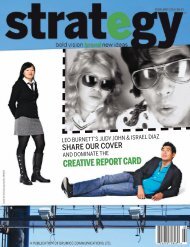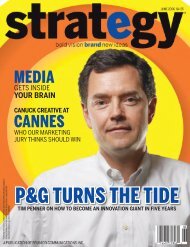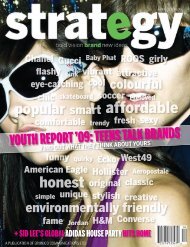THENEWRATPACK - Strategy
THENEWRATPACK - Strategy
THENEWRATPACK - Strategy
Create successful ePaper yourself
Turn your PDF publications into a flip-book with our unique Google optimized e-Paper software.
PHOTO BY MICHAEL BENABIB<br />
��������bookmarketing<br />
After spending two-plus decades creating strategic<br />
visions for companies like Citibank and AT&T<br />
– I thought my brand-shaping days were behind<br />
me after I sold my first novel. But, soon after I<br />
decided to leave advertising, my publisher sent me<br />
an author questionnaire that presented me with an<br />
ironic challenge: how to position the brand of me.<br />
Now, to readers of this magazine, this<br />
may not sound terribly outrageous. I mean,<br />
who hasn’t subconsciously and more likely<br />
consciously tinkered with their own version of<br />
brand me. What you wear, how and when you<br />
choose to express yourself in meetings and<br />
the type of work you create are all expressions<br />
of brand you. In marketing, image cultivation<br />
and self-promotion come with the territory.<br />
But in the book world, especially literary<br />
fiction, any type of promotion, let alone<br />
self-promotion, is a radical and potentially<br />
dangerous proposition. Yet…some have done<br />
it brilliantly. Mark Twain and Oscar Wilde<br />
pulled it off. Even Canadian Stephen Leacock<br />
toured aggressively to promote his books and<br />
causes. But overall, selling one’s art is frowned<br />
upon, if not detested. In fact, at this year’s<br />
BookExpo America in Washington, D.C.<br />
literary icon John Updike used his keynote<br />
platform not to promote his novel Terrorist,<br />
because that would be “immodest,” but to<br />
reminisce about the bookstores of his youth.<br />
Immodest? Easy for a 74-year-old, prizewinning<br />
legend who’s taught in universities<br />
to say. Brand Updike (a phrase that would no<br />
doubt gall him) is all set, his backlist poised to<br />
sell forever. But what if he were, say, a 45-yearold<br />
who finally realized his dream of publication<br />
after decades of trying, a man whose biggest<br />
literary award was for a telecom commercial?<br />
54 STRATEGY September 2006<br />
By James P. Othmer<br />
Would Updike<br />
have a MySpace?<br />
Ex-ad guy mashes CPG past and CGM present to make waves in old-school, promo-shy book biz<br />
CORRECTION<br />
In the Biz article “Nestle’s innovation renovation,”<br />
(strategy, August 2006), strategy mistakenly<br />
quoted Nestlé Canada president/CEO Bob<br />
Leonidas as saying that Whiskas is a Nestlé<br />
product when, in fact, it is an Effem product.<br />
Friskies is one of Nestlé's cat food brands.<br />
<strong>Strategy</strong> regrets the error.<br />
What if he didn’t know if he’d ever have another<br />
chance at making it? Would Updike have a<br />
MySpace page? Would he have his friends shoot<br />
a commercial for him on the cheap?<br />
So I did a brief for brand me and my novel<br />
The Futurist. The mission statement for brand<br />
me was to be taken seriously as a writer of<br />
satirical literary fiction, to sell a gazillion copies<br />
and to get on The Daily Show with Jon Stewart<br />
without alienating, say, the readers of The New<br />
York Review of Books. That’s all. Next I homed<br />
in on the early adapters and big-mouths of<br />
the literary reading world, with an ancillary<br />
emphasis on the advertising community.<br />
www.strategymag.com<br />
We did the latter because first novelists without<br />
a James Frey-like past don’t make for the most<br />
compelling media stories. So, despite desperately<br />
wanting to strut my writerly creds, it was obvious<br />
that – more irony – the ex-ad guy wrote a novel<br />
angle would eventually get me the most attention<br />
beyond reviews. I guess I can always smoke a<br />
pipe and wear a tweed jacket for book two.<br />
Next I made sure that my brand had a<br />
creation story: the voice for The Futurist was<br />
ultimately fueled by the experiences I had in<br />
advertising, the profession which, ironically,<br />
I had accused for years of sapping me of my<br />
creative soul. People seemed to like this, and<br />
The mission statement for brand me was<br />
to be taken seriously as a writer of satirical<br />
literary fiction, to sell a gazillion copies and<br />
to get on The Daily Show with Jon Stewart<br />
the best part is that it’s actually true.<br />
We got the word out to pop culture and<br />
literary blogs, the business press. My friends<br />
did do that video for me, and more friends<br />
helped me build a website. My nieces<br />
and nephews did a MySpace page for my<br />
protagonist Yates, which has become something<br />
of a performance art/bizarre marketing hit.<br />
The hardest part has been trying, sans real<br />
media budget, to get people to actually see the<br />
above. So far, the best way has been to get good<br />
reviews, and to revert to getting out and meeting<br />
booksellers face to face, signing copies and doing<br />
readings. Whether or not any of this has worked<br />
remains to be seen but I’d like to think the effort<br />
would have made Twain and Wilde and Leacock<br />
proud. By the way, I really liked the Updike<br />
book, and said as much in my blog.<br />
James P. Othmer’s first novel The Futurist was<br />
recently published by Doubleday Canada. Before<br />
leaving advertising to write (and promote) fiction<br />
full-time, he was an ECD at Y&R New York. He<br />
can be reached at jamespothmer.com.














